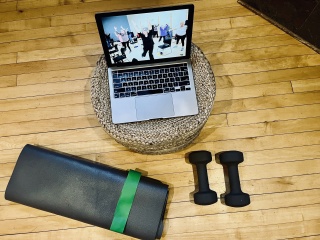Shoulder Pain
Shoulder Pain Care at UVM Health
The shoulder joint is a complex structure of bones, tendons and soft tissues. These structures allow you to move your arms smoothly and perform basic movements like scratching your back or brushing your hair. Any damage to your shoulder joint can cause pain and interfere with daily activities.
At University of Vermont Health, our orthopedic surgeons and sports medicine physicians have decades of experience evaluating and treating shoulder pain. We treat more people with shoulder pain than any other team in the region.

Why Choose UVM Health?
We offer a full range of therapies to help keep you as healthy and active as possible, with less pain. As one of the leading orthopedic programs in the region, we offer:
- Patient-centered approach: We spend time with you to learn more about your concerns, preferences and priorities. Our care plans prioritize a nonsurgical approach, and we only recommend surgery when it’s the most effective choice.
- Specialized experts: Our sports medicine physicians and orthopedic surgeons have subspecialty training in shoulder care. They focus on specific conditions, such as degenerative diseases or sports injuries, so you always receive treatment from an expert.
- Research emphasis: As part of a health system anchored by an academic medical center, our physicians are active researchers, many of whom are training the next generation of experts. We are at the forefront of research into shoulder pain.
Causes of Shoulder Pain
Any damage to the bones and soft tissues in your shoulder joint can lead to pain. You may experience a sudden injury that causes shoulder pain. Or the tissues in your shoulder joint may wear down over time, leading to inflammation and chronic discomfort.
Common causes of shoulder pain include:
- Arthritis: The flexible connective tissue at the end of your bones (cartilage) wears away, causing pain and inflammation.
- Bursitis: The fluid-filled sacs (bursae) that cushion your shoulder joint become inflamed.
- Dislocated shoulder: Your shoulder’s ball-and-socket joint is forced out of its usual position.
- Frozen shoulder: Inflammation in the lining of your shoulder joint causes pain and stiffness.
- Rotator cuff injuries: The muscles and soft tissues that surround and stabilize your shoulder joint become inflamed or injured.
- Shoulder fractures: One of the bones in your shoulder breaks.
- Tendonitis: The thick bands of tissue that connect muscle to bone (tendons) become inflamed.
Diagnosing Shoulder Pain
When diagnosing shoulder pain, your specialist will physically examine your shoulder. They may move your arm into several positions to look for signs of specific injuries, such as a rotator cuff tear. Then they’ll ask about your symptoms, including when they started, how they’ve progressed and what, if anything, relieves them.
They may also use imaging to get a closer look at your bones and soft tissues, including:
Shoulder Pain Treatment
Treatment for shoulder pain varies depending on the underlying cause. Usually, we can treat shoulder pain with nonsurgical methods. Our specialists only recommend surgery when we believe it’s the most effective option for your needs. Treatment for shoulder pain may include:
Specific movements may trigger or worsen shoulder pain. You may need to avoid certain movements while you heal.
You may need to take medications, such as nonsteroidal anti-inflammatory drugs (NSAIDs) or acetaminophen. These over-the-counter options relieve inflammation and reduce pain.
You may need to participate in physical therapy. A physical therapist teaches you exercises to improve your shoulder strength and range of motion.
Cortisone injections can be an effective treatment for a frozen shoulder or rotator cuff injury. Your provider uses ultrasound guidance to deliver cortisone directly to your shoulder joint. The injection helps relieve pain and inflammation and often speeds recovery.
Some people with severe shoulder pain may benefit from arthroscopic surgery. In an arthroscopy, your surgeon uses a long, flexible tool with a camera (arthroscope) and special surgical tools. They may release tight tissues, remove bony growths (spurs) or reattach torn tendons.
Rarely, people with severe damage to a shoulder joint need a shoulder replacement surgery. During this procedure, your surgeon removes the ball and socket of your shoulder and replaces them with artificial parts.
Locations Near You
Share your location to see nearby providers and availability
75 Park Street
Elizabethtown, VT 12932
101 Adirondack Drive
Suite 1
Ticonderoga, NY 12883
187 Park Street
Suite 2
Malone, NY 12953-1233
6 San Remo Drive
South Burlington, VT 05403-6378
192 Tilley Drive
South Burlington, VT 05403-4440
1311 Barre Montpelier Road
Suite 400
Berlin, VT 05602
1436 Exchange Street
Middlebury, VT 05753-1185
76 McNeil Road
Suite 2
Waterbury Center, VT 05677-7162
206 Cornelia Street
Suite 201
Plattsburgh, NY 12901-2779


